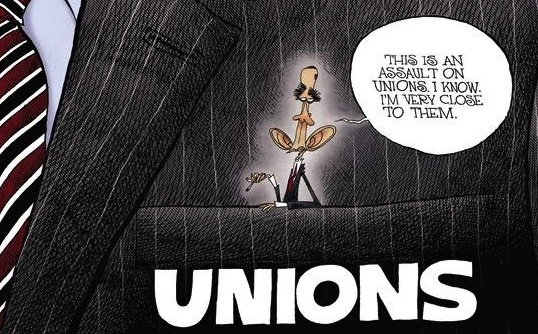Private sector union membership peaked at nearly 36 percent of the workforce in the mid-1950s. It’s been downhill ever since.
An unprecedented trend is reshaping the contemporary American workplace: U.S. workers are headed in one direction even as union leaders and their bought-and-paid-for politicians and bureaucrats in Washington are going full-gallop in the opposite direction. Unfortunately, this development is rarely if ever mentioned in the news pages of the liberal precincts of the mainstream media. That absence is especially unfortunate because the way Americans work is undergoing fundamental change.
For their part, workers are leaving traditional labor unions and have been doing so for years. Union membership in private sector companies was 6.7 percent in 2013, according to the U.S. Bureau of Labor Statistics. Private sector union membership peaked at nearly 36 percent of the workforce in the mid-1950s. It’s been downhill ever since. Government workers remain by far the most unionized, at 35.3 percent. Together, the overall percentage of the nation’s workforce that is unionized was only 11.3 percent, representing 14.5 million employees.
The most recent illustration of this ongoing de-unionization of the private sector workplace was in the rejection of the United Auto Workers by Volkswagen employees in the German firm’s Chattanooga, Tenn., plant. That rejection came despite heavy pressure from UAW organizers and VW management. The Tennessee loss probably means none of the 16 plants established in the U.S. by foreign car makers will be unionized any time soon. The main reason is that almost all of the foreign-owned plants are in right-to-work states, where individual employees cannot be forced to join unions.
Meanwhile, back in Washington, the union bosses who, according to AFL-CIO Political Director Michael Podhorzer, will funnel at least $300 million into 2014 Democratic campaign coffers, are calling due on their support of President Obama in 2008 and 2012. Obama’s appointees at critically important federal labor-management regulatory bodies are only too eager to help. The National Labor Relations Board, for example, denied a recent request for more public comment time on “ambush elections,” which are strongly favored by unions.
The request came from two Republicans, Rep. John Kline of Minnesota, chairman of the House Committee on Education and Workforce, and Rep. Phil Roe of Tennessee, who chairs a key subcommittee on the issue. The NLRB’s Obama-appointed chairman, Mark Gaston Pearce, said the minimum requirement of 60 days would provide everybody “ample” time to comment. Pearce and the union bosses have no desire to allow more negative comments to reach NLRB.
The ambush rule would result in companies having as little as seven days to identify all of the legal issues involved in a union representation election. Any issues discovered after those seven days would not be allowed to affect the process. In addition, the rule would require that employers provide union organizers with the private contact information of all employees. Clearly, the aim is to tilt elections in favor of unions by giving managers and employees as little time as possible to fight organizing efforts. Big Labor’s handmaidens in the capital must think workers aren’t smart enough to sniff out the ruse. We bet they are.
. . . . . . . . . . . . . . . .
This article was published at The Washington Examiner.
